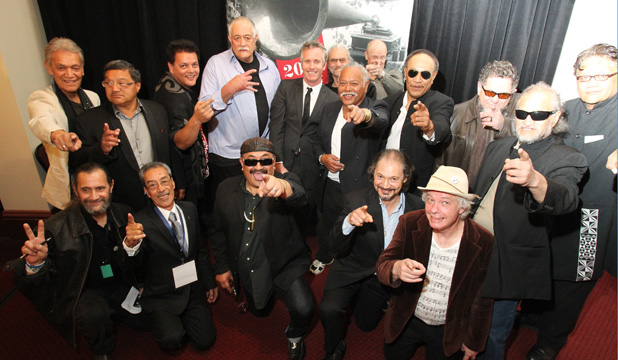
Songs by Herbs have often reflected important political issues in New Zealand. Now they are turning their guitars towards Christchurch. Vicki Anderson talks to Dilworth Karaka. Herbs perform at Morrell and Co in Christchurch tomorrow night.
Do you know what makes the ocean glow
Herbs’ 1982 song French Letter is clear in expressing gentle but effective anti-nuclear protest against French nuclear testing at Mururoa Atoll.
Three decades later, it is a song that still resonates with New Zealanders.
“Let me be more specific, get out of the Pacific,” sings Dilworth Karaka, a founding member of the band.
“It is one of my favourite songs of ours. I had a small part to play with it with Toni Fonoti just writing words.”
When he did so, he imagined they were sitting on a beach, about to make a barbecue, roast a pig or lamb, against the background of a nuclear blast.
More than 30 years and eight albums later, Herbs are arguably the founding fathers of Pacific reggae in New Zealand.
They sang about the Crown’s treatment of Maori land rights, dawn raids, French nuclear testing, Japanese drift-net fishing, racism and the occasional love song, all dished up in a palatable, easy on the ear, reggae style.
Strongly political, the band’s album cover of Whats’ Be Happen, released during the 1981 Springbok tour, was an aerial photo of police action at Bastion Point in 1978.
In 2012, Karaka, Toni Fonoti and 15 of their bandmates were inducted into the APRA New Zealand Music Hall of Fame.
Acknowledging the accolade, Don McGlashan described Herbs as having broken down a great many doors when they came onto the scene in the early 1980s.
“They fused Pacific and reggae sounds into something unique and relevant to this part of the world; they gave a voice to an emerging, politically aware audience that had grown up with the Springbok tour, Bastion Point and Mururoa, and they gave a generation of young Maori and Pasifika musicians and songwriters a new path to follow,” McGlashan said.
Karaka, 64, struggles to name any contemporary band offering politically minded songs to the nation.
“I can’t, maybe they’re out there but I can’t name them.”
Easing his way back into the live circuit again after knee-replacement surgery, he performs in Christchurch tomorrow night for a gig which marks the end of New Zealand Music Month.
“Everybody is ticking off the health situation, bad eyes, bad legs. We’ve been sorting that out and now everyone has a warrant of fitness for the next few years. I’m sure we’ll get a few more miles out of it.”
Joining him on acoustic guitar for the unplugged show are Tama Renata and Tama Lundon, with Thom Nepia on percussion.
Herbs are the equivalent of our Rolling Stones or “Rolling Stoned” as some have described them. There’s an assumption that with iconic status comes money.
“We should have been millionaires,” Karaka laughs.
“In the early days we sold our soul to record our music that we were writing and playing. You’re happy with it at the time and then you see things change, the gravy train rolls along and you’re not getting your gravy.
Ad Feedback
“We made mistakes with management, money, we just needed to have the right people at the time to handle our publishing and our royalties but we didn’t.”
He believes music is drastically undervalued in New Zealand.
“I don’t know where that comes from. The income generated for the country is huge.”
He accepts that Herbs have “iconic” status, their name rolls off the national tongue as easily as jandals and buzzy bees.
Looking back on the political issues they raised, he believes they were right to push as they did.
“The Springbok tour protests split our country right down the middle at the time but now I think we’re a lot better for it.”
Karaka thinks fondly of the South Island.
Back when French Letter was on the airwaves, radio DJs were unable to say the song’s title on air.
“The DJs in the South Island were pretty onto it, they would introduce it as ‘this is a song from the band Herbs in Auckland, it’s called a letter to France’. We liked that. It’s the Kiwi way.”
Karaka reckons they have one more album to do before the guitars are eventually hung up for good.
“We’ve got a couple of songs about the fishing grounds situation and, the other thing, is Christchurch. What’s happening there … On the news we see the anguish of the people every day.
“We might have to come up with a song when we play there.”
– The Press